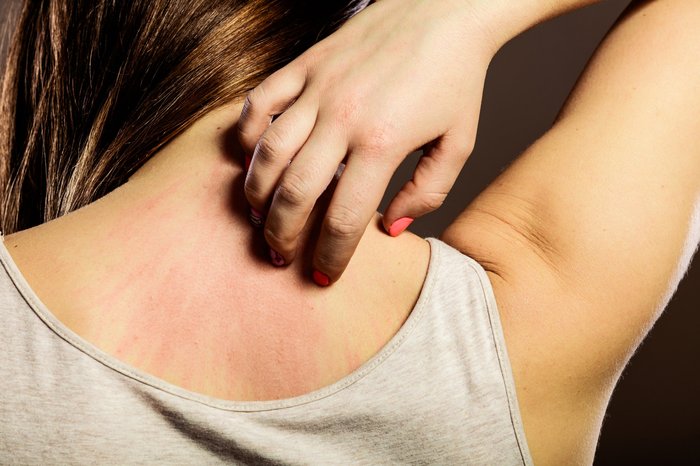Itching of the skin (also called CKD-associated pruritus) is common in people with chronic kidney disease (CKD). It can be a serious problem for many people and can have a major effect on your quality of life.
How common is itching?
Itching is very common, affecting around half of people with advanced kidney disease and almost everyone with kidney failure who is receiving dialysis or conservative care.
You may find that you get itchier as your kidney function gets worse.
A number of things can cause itching, such as allergies, eczema, some toiletries and cleaning products, and certain drugs such as morphine-based painkillers. However, why people with kidney disease itch is not well understood and a number of factors may be involved.
Itching in people with kidney disease might be caused, or made worse by:
- dry skin
- warm temperatures
- not enough dialysis
- high blood levels of calcium

How will itching affect me?
Itching affects people in different ways. It can come and go or it may be continuous.
It may affect your whole body or be limited to a specific area – usually your back or arms. Itching tends to affect both sides of the body at the same time and may feel internal, like a crawling feeling just below the skin.
You are more likely to be itchy at night, which can affect your sleep and make you tired the next day. This can affect your mood. In severe cases, itching can affect your social life due to severe irritation and restlessness.
Itching can affect how your skin looks. It may be dry and crack easily, which can cause bleeding. You may see marks or cuts where you have scratched, and this can increase the risk of infection.
How can I soothe kidney itch?
Itching can be eased by:
- Wearing loose, non-irritating clothing made of natural fabrics, such as cotton.
- Changing your toiletries or cleaning products.
- Avoiding particularly dry environments.
- Avoiding wearing perfumes or aftershave.
- Using unscented shower and bath products.
- Patting rather than rubbing your skin dry after a bath or shower.
- Using an unscented moisturiser on dry areas of skin (some people also find moisturisers containing menthol and aloe vera can be helpful). This should be used every day, not just when you are itching, in order to maintain the skin’s barrier prevention. Your pharmacist can advise on suitable products.

Are there any other treatments?
Itching can be difficult to treat, and you may need to try different treatments before you find one that works for you.
To work out whether your itching is severe, it can be helpful to score it out of 10, where 10 is the worst itching you can imagine. Scoring 7 or more suggests the itching is severe.
If you would be prepared to take regular medication for it, it’s time to talk to your healthcare team about possible medicines including:
- Gabapentin, pregabalin and difelikefalin. These are medicines your kidney team might consider prescribing for chronic kidney disease-related itch. They can reduce itching by affecting how your nerves work. They can also make you sleepy and dizzy. The dose must be carefully monitored.
- Antidepressants. These may reduce your itching but can take a while to have an effect.
- Phosphate binding medications. These medications lower your blood phosphate levels but do not have a specific effect on this type of itching. If your doctor has advised you need these, then you should keep using them.
- Oral antihistamines. These are often tried for itching. However, the mechanism of itching associated with kidney disease is different from allergic itching and so antihistamines are usually not effective. Antihistamines can make you feel tired so if you do try them, it is best to take them before you go to bed to help you sleep. You should avoid using them if you are planning to drive or use machinery.
- Phototherapy with ultraviolet B (UVB) light. This may reduce your itching but can take a while to have an effect. Some studies suggest UV light treatment may be effective in reducing itching in patients with CKD. It is thought to work by reducing inflammation and will be prescribed by a specialist skin doctor. UVB therapy is associated with an increased risk of cancer and should not be used in patients who are on immunosuppressant drugs or in patients with systemic lupus erythematosus.
Some of the medicines above are not licensed for use for itching and it is important to discuss this with your doctor before trying them.
You should always follow your healthcare team’s advice regarding medications.
You may be referred to a specialist skin doctor (dermatologist). They can help to identify any other conditions that may be causing your itching but are not related to your kidney disease.
If itching becomes a major problem, you may decide to seek psychological support as there are tools available that can help you to manage, such as breathing techniques and mindfulness. Speak to your kidney team for advice.
Even if your itching is worse after dialysis, you should always stick to the dialysis schedule advised by your doctor.
If you receive a kidney transplant, the itching associated with your kidney disease will go away.
Where can I find more information about CKD and itching?
Talk to your healthcare team about your itching and how it affects you. It is particularly important to talk to them before changing or starting any medications.
Read more about CKD-associated pruritus:
- Kidney itching: your questions answered
- Talking to your doctor about kidney itching
- 5 things every patient needs to know about kidney itching
- Kidney-related itching: tips to help ease the itch
Itching and chronic kidney disease (CKD): download or order Kidney Care UK's information leaflet
You can download our Itching and chronic kidney disease leaflet for free.
You can also order a printed copy of Kidney Care UK’s Itching and chronic kidney disease leaflet to be sent to you in the post.

Publication date: 07/2023
Review date: 07/2026
This resource was produced according to PIF TICK standards. PIF TICK is the UK’s only assessed quality mark for print and online health and care information. Kidney Care UK is PIF TICK accredited.